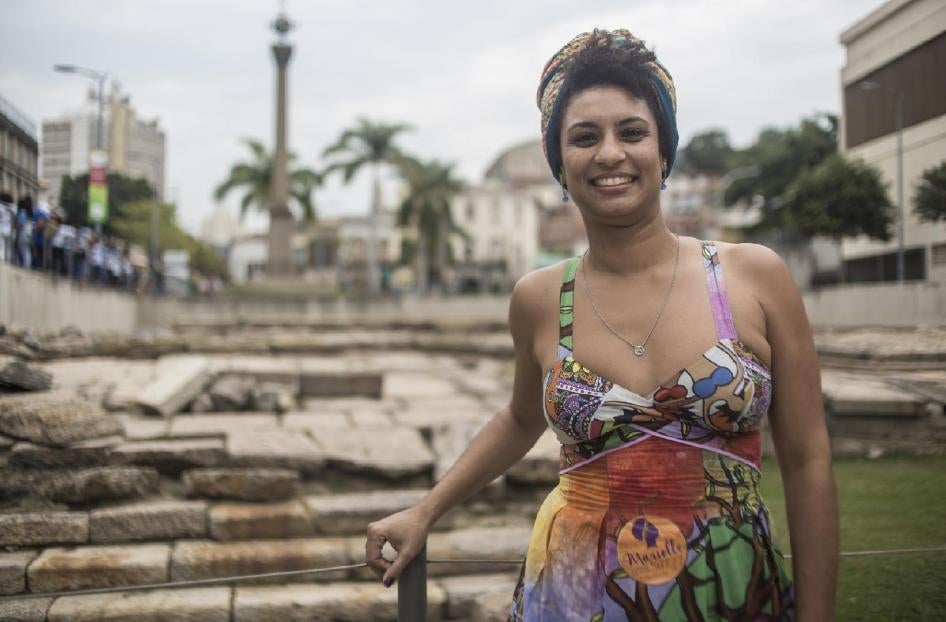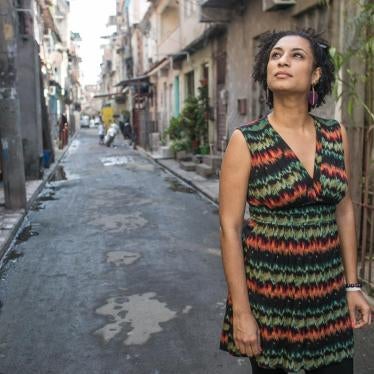The news on the night of March 14 of the brutal murder of Marielle Franco, along with her driver, Anderson Pedro Gomes, in downtown Rio de Janeiro, felt like a kick in the stomach. She had helped Human Rights Watch document police abuses in Rio de Janeiro before I joined the organization. Later, we crossed paths at events. Everyone knew of her tireless work on behalf of the most vulnerable people –women, blacks, and the poor.
I felt anxious and powerless as I turned out the light that night, and I could barely sleep. The short flight from Sao Paulo to Rio de Janeiro is usually fun, as I anticipate reconnecting with friends and colleagues in the “wonderful city.” But the morning after the murders, en route to pay last respects to a professional partner, Marielle, and to Anderson--and to show solidarity with their friends, families, and constituents—I couldn’t shake a feeling of dread.
I kept taking calls for interviews from national and international media, during the quick ride from the airport to downtown Rio, and it was only there, in the thronged streets, that I finally lifted my head and felt some relief. Thousands of people had come out to protest the murders. Many people who had been privileged to know Marielle better than I did spoke of her, and the words persistence, down-to-earth, and cheerfulness kept cropping up.
Cheerfulness is not a trait we tend to think of as characterizing human rights defenders, who spend their days gazing directly at the worst things humans can do to each other. But Marielle drew her joyful, assertive spirit from the communities she represented, most recently as a councilwoman in Rio de Janeiro.
Yet Marielle and Anderson are only the most recent victims, like tens of thousands of others throughout Brazil, of a failing public security policy.
In a country where inequality and endemic violence victimize such people every day, there is no way to overemphasize the importance of Marielle’s fierce, calm, unyielding representation. She denounced police abuses in poor neighborhoods and defended the fundamental right of every citizen, regardless of origin or social status, to live safely.
In return, some detractors accused Marielle of defending "bandits"—and even in the shadow of the crime that has forever silenced her, critics continue to speak as though her work for a functional system of justice and public order was somehow suspect. The current military approach to fighting crime in poor communities and a disrespect for fundamental rights fuel an unending cycle of violence and corruption. Victims of this failure are not only the residents of poor neighborhoods and human rights defenders but also the police themselves, something Marielle was acutely aware of.
As I stood on tiptoe at the corner of the state legislative assembly of Rio de Janeiro, watching the crowd grow and listening to demands for a through and independent investigation of the murders of Marielle and Anderson, hope started to sprout once again through the cold gray loneliness of impotence. We will achieve clarity about this horrendous crime, hold those responsible to account and bring justice for the families and the wider community of Rio and Brazil.
That’s the pledge I felt rising from the crowded sidewalks of downtown Rio. We will fight for human rights and against impunity. That is the only way to end the chronic insecurity that afflicts us all.









